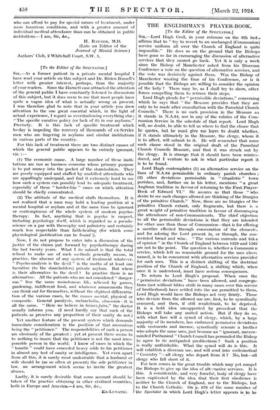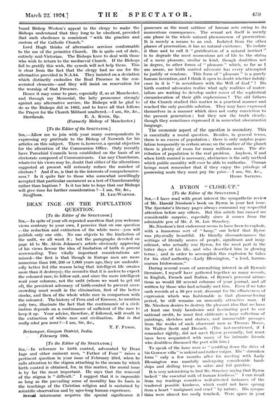THE ENGLISHMAN'S PRAYER-BOOK.
[To the Editor of the SPECTATOR.] SIR,—Lord Hugh Cecil, in your columns on the 8th inst., affirms that to " try to revert to an unchanged (Communion) service uniform all over the Church of England is quite impossible." He does so on the ground that the Bishops have gone so far in encouraging the discussion of alternative services that they cannot go back. Yet it is only a week since the Bishop of Manchester asked from his Diocesan Conference a vote on the question of alternative services, and the vote was decisively against them. Was the Bishop of Manchester wasting the time of his Conference, or is it possible that the Bishops are willing to consider the opinion of the laity ? There may be, as I shall try to show, other forces compelling them to retrace their steps.
Lord Hugh pleads for " permissible deviations," concerning which he says that " the Measure provides that they are only to be made after consultation with the Parochial Church Councils." There is no such provision in the Measure as it stands in N.A.84, nor in any of the rubrics of the Com- munion Service in the schedule of that report. Lord Hugh will, no doubt, be able to tell us where to find the clause that he quotes, but he must give me leave to doubt whether, if it stands ultimately in the Measure, the clergy, whom it is to affect, will submit to it. He will remember that some such clause stood in the original draft of the Parochial Church Councils Measure, and' that it was struck out by the clergy. It is strange that it should have been reintro- duced, and I venture to ask in what particular report it is to be found.
Lord Hugh contemplates (1) an alternative service on the lines of N.A.84 permissible in ordinary parish churches ; {2) other deviations permissible in " ritualistic " town parishes, and, further on in his letter; mentions " a great Anglican tradition in favour of returning to the First Prayer- Book of Edward VI." lie assures us that those " who desire to see such changes allowed are thinking of the liturgies of the primitive Church." Now, there are no liturgics of the primitive Church extant, only fragments, but there is a great weight of primitive tradition in favour of discouraging the attendance of non-Communicants. The chief objection to all the permissible deviations is that they are intended for other uses than those of Communion—that is for offering a sacrifice effected through consecration of the elements, and for adoring the Lord present in, or through, the con- secrated bread and wine. " The various currents and tide s of opinion " in the Church of England between 1529 and 1562 are not to the point. The question is, whether a Communic n service, which left no reasonable ground for the uses above named, is to be concurrent with alternative services provided for such uses. This is a distinct shifting of the doctrinal position of the Church of England, a shifting which, when once it is understood, must have serious consequences.
To return to Lord Hugh's proposal. When once the
permissive deviations " have been allowed, and congrega- tions (not without bitter strife in many cases over this service of brotherhood) have settled into the use permitted to them, Lord Hugh would have the Bishops act very firmly. Those who deviate from the allowed use are, first, to be synodically censured, and then, if still recalcitrant, to be deprived. It is a bold idea unsupported by precedent that the Bishops will take any united action. But if they do so, with what face will a synod of clergy, which, by a large majority of its members, has embraced permissive deviations with vestments and incense, synodically censure a brother who adopts the same uses, just because an " ignorant, narrow- minded Puritanical " Church Council has persuaded the Bishop to agree to its antiquated predilections ? Such a position is really unthinkable. What the synod will do is this. It will establish a diocesan use, and will send into ecclesiastical " Coventry "—all clergy who depart from it ? No, but—all clergy who fall short of it.
For here comes in the great trouble which may yet compel the Bishops to give up the idea of alternative services. It is this. A considerable, and very forceful, body of clergy have been captivated by the idea that their first obedience is neither to the Church of England, nor to the Bishops, but to the Church Catholic. On p. 376 of the same number of the Spectator in which Lord Hugh's letter appears is to be
found Bishop Weston's appeal to the clergy to make the Bishops understand that they long to be obedient, provided that such obedience is consistent " with the practice and custom of the Catholic Church."
Lord Hugh thinks of alternative services conformable to the use of the primitive Church. He is quite out of date, entirely mid-Victorian. The Bishops have to deal with those who wish to return to the mediaeval Church. • If the Bishops fail to gratify this wish, the synods will not help them. This is clear from the fact that the clergy had no use for the alternative provided in N.A.84. They insisted on a deviation which distinctly embodies the Real Presence in the con- secrated elements—and they will insist on reservation for the worship of that Presence.
Hence it may come to pass, especially if, as at Manchester, and through my Memorial, the laity pronounce strongly against any alternative service, the Bishops will be glad to do as the Bishops did in 1662, and to leave all that follows the Prayer for the Church Militant unaltered.—I am, Sir, &c., (Formerly Bishop of Manchester.)















































 Previous page
Previous page